
The Art of Non-Alcoholic Spirits
blog
For decades, spirits and cocktails have fostered a culture of craft, connection, and celebration. But over time, cocktail culture has evolved far beyond the buzz!
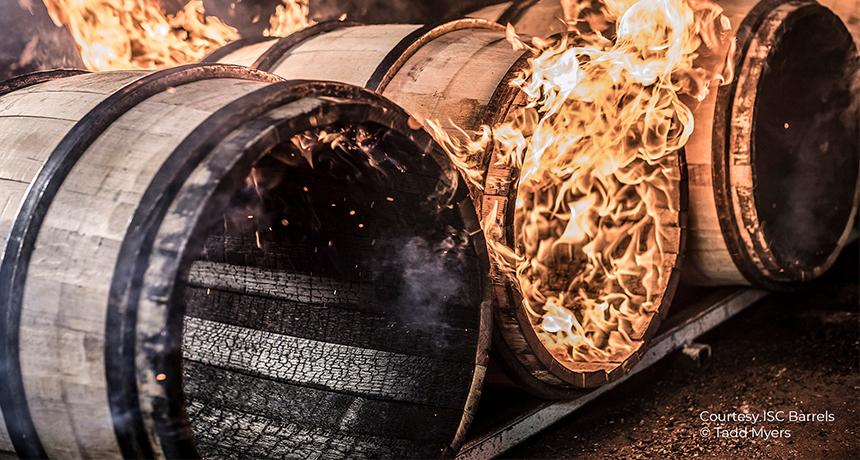
Have you ever thought about making your own whiskey? Did you know that barrel aging contributes a majority of a whiskey's flavor? That's right-and it's also reason enough to warrant a whole curriculum on the art and science of aging spirits.
Ahead of Moonshine University's next Barrel Aging Workshop, we talked to experts Andrew Wiehebrink of Independent Stave Company and Gregg Snyder of Distilled Spirits Consulting to get the inside scoop on maturation, how they built their careers around their passion, and what lies ahead for the distilling industry.
Wiehebrink: "I'm a mechanical engineer by trade and was always a big Bourbon geek. Before I joined the team at Independent Stave Company, I worked on designing a machine that froze alcohol into ice cubes. Through that design and the promotion of that product, I got to go out into the field and meet a lot of people in the industry. I decided that was somewhere where I wanted to stay for a while. An opportunity with Independent Stave Company arose, and that's when I finally decided to make the switch."
Snyder: "I got started in the distilling business in 1978, right out of college. I attended Indiana University Southeast and they had a career placement department that would post interviews of companies looking for candidates for potential employment. One of the interviews I signed up for was with Joseph E. Seagram & Sons. I was interviewed and lucky enough to land a job as a frontline supervisor where I eventually served every department in the production division. It was a great training experience that provided exposure to every aspect of the operations side. Afterwards, I went to work for Brown Forman for the next 12 years. I started out managing their Bottling Operation's afternoon shift and then I earned several promotions. I wound up at their barrel factory, called Blue Grass Cooperage at that time. Nine of the 12 years I worked for Brown Forman, I managed their Cooperage Operations. I had the experience and knowledge of making whiskey, and with this opportunity I gained the knowledge and experience of making a barrel and doing it right."
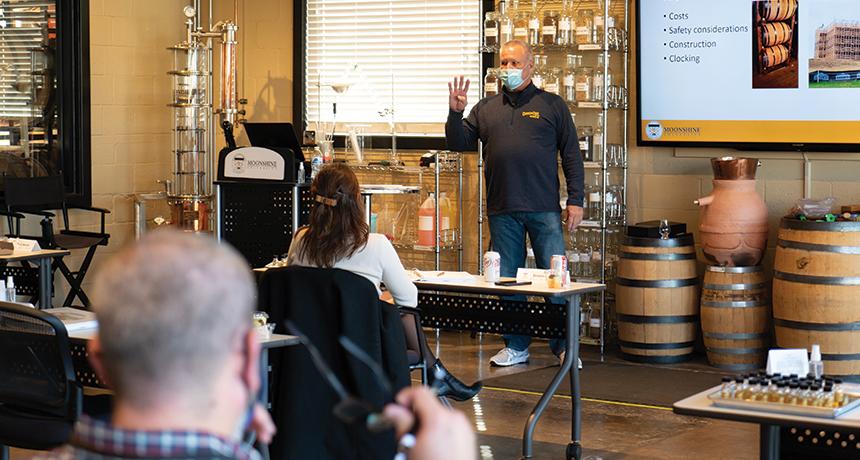
Wiehebrink: "Maturation is just fascinating. I think one of the things that makes it so captivating is that-with so many variables involved-it seems like it's nearly impossible to decipher. There's always something to do, figure out, learn or test. Coming from an engineering background, you're already inherent with that tinkering nature; the fact that there's always something to tinker with is why I enjoy this job so much."
Snyder: "I've always been ambitious to forward my career and learn as I went. I can honestly say that not a day has gone by where I haven't learned something new. That challenge and my passion for the industry is the driving element that's kept me on the hook for so long."
Wiehebrink: "I always say that's perfectly okay. There was a time when I didn't like brown liquid either. I think it's one of those tastes-not necessarily acquired, but kind of earned. I wanted to learn about Bourbon. I wanted to learn how to taste it. Through that process and dedication to that goal, that's when I started to appreciate and develop a taste for it. If you get a chance to sit down with someone who really enjoys Bourbon, don't miss out on the opportunity to keep an open mind and try to learn something new. Don't look at it as a ‘getting drunk' experience, look at is as an ‘educational' launching point."
Snyder: "It's not for everybody. It's definitely an acquired taste. Quite honestly, in the 1970s when I was in college, my generation was into light spirits. The dark ones were on the decline. For me, personally, my dad was a Bourbon drinker, so that's how I got to drinking Bourbon and learning to enjoy it. When I got into the industry, it became my passion. It's interesting to see the younger generation leaning toward Bourbon now because they seem much more educated in knowing what they want and what they like. I think there's definitely a link there."
Wiehebrink: "It depends on the kind of day I had. If it's been a rough day, I usually go for some of the higher-proof stuff at home. If it's been a really good day, something to celebrate, I might reach for something that's a little more expensive or hard to find. I'll switch to beer, maybe have some wine sometimes, but I would probably say my go-to drink is just Bourbon, neat."
Snyder: "I'm leaning toward Bourbon; but honestly, I don't have a favorite. There are some Bourbons that I have enjoyed over the years, but there is not one true favorite that stands out. There are a number of them that I like, so it's hard to choose. I prefer a rye-based Bourbon, typically. Having said that, there are some great wheat-based Bourbons I enjoy as well."
Wiehebrink: "The biggest lesson that I tell people is that the industry was built on a char 4 barrel, but keep in mind there are many more options out there. The possibilities are truly endless. I think that's one of the good things about this class: if you're a distiller, we teach you about all kinds of barrels that are outside of the norm. A lot of the students who take the class are craft distillers, so they don't have the luxury of sitting on thousands of barrels for seven-to-eight years to get the right flavor profile. In the class, we introduce them to barrels that can give them the right flavors quicker."
Snyder: "From the barrel aspect, students will learn how important the barrel is to the process. I think most people think the barrel is just what you put your whiskey in-you let it sit and it makes the whiskey better when it comes out. Yes, that's all true; however, most people don't realize that 60 to 70 percent of the flavor of a finished Bourbon comes from the barrel itself. The class teaches you the magic behind how that happens. You learn the chemistry of white oak and why it's used to make barrels, and what different variables like toasting and charring can do to an aging spirit. Likewise, part of what I get into in my section, I show people a sample of a liquidation distillation model you can use for planning your inventories."
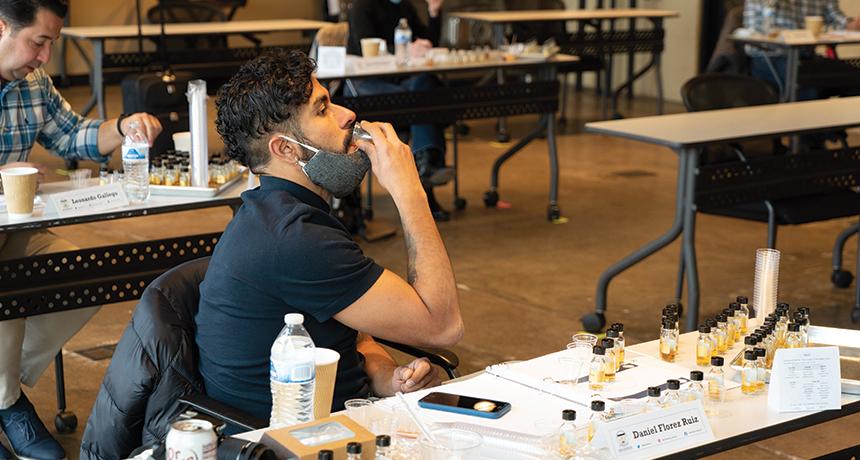
Wiehebrink: "Differentiation and consistency are key, as funny as that sounds-this is something we really stress on in the class. Most of the distilleries that have been doing this for a long time have built their standard flavor profiles on the char 3 or 4; this class gives them a chance to not only learn something new, but taste some of the other options they may not have been able to explore before due to certain constraints. For the brand-new distiller, it's a huge time saver. When we started this class, we put down 30 to 40 experimental barrels. Those whiskies are already about three years old. We look at everything from char level to toast level, different wood species, wood age, etc. That means you don't have to go through trials; we already have the trials right here for you to taste."
Snyder: "This class is great for seasoned professionals and newbies, alike. People who have been in the industry for a while get more of a detailed insight as to why the barrel is so important to the outcome of their product. They learn the advanced take on the science behind what actually happens during the barrel aging process and how small changes in variables can make huge differences in the result. The class is especially beneficial for the people who are thinking about getting into the business or those who are just getting started. Not only do they get the advantage of exploring barrel aging variables without the time and cost investment, but we also provide insights on warehousing design, how to store barrels, and the advantages and disadvantages of different layouts and storage conditions."
Wiehebrink: "My favorite part of the class is the experiments. Again, we started those with brand new distillates and now we're about three years into the class so we're really starting to see some interesting results. In that sense, it's learning for me too. I'm the instructor, but in this case, I get a chance to experience the changes in the spirit from each variable too as we taste them every six months."
Snyder: "My favorite part is the interaction with attendees who are engaged, eager to learn, and asking good questions. I enjoy it because everyone who is in that class really wants to be there and sees the value in it. To be able to share some of my knowledge and experience with so many passionate professionals doing great things in the industry is rewarding-and a lot of fun!"
Wiehebrink: "Distilling isn't going anywhere but the producers can't be static. Distillers are always going to have to reinvent and push the envelope on innovation, which I think is good. The barrel is a great way to do that because the possibilities are endless and because it contributes so much flavor. If you're interested in being a part of that innovation, this is a great class. And even if you're just looking to advance your knowledge so you can continue to do what you do best, everything you learn in this class will still be relevant."
Snyder: "Where aged spirits are concerned, you can go way back in history and see the ebb and flows of demand. In the 1950-60s, the Bourbon industry was booming, but once the next generation came along, that changed. The 70s and 80s saw a slow decline, but once again, they seem to be on the rise. It begs the question-how long is this boom going to last this time? You can talk to 50 different people and get 50 different answers. From my experience, I think it's going to last for quite a while-hopefully the rest of my life."
Wiehebrink: "When I give out advice to new distiller, I usually try and stick with maturation. The char 4 barrel is a great barrel, but I would challenge you to try a bunch of different types of barrels, if you have the means. The best way to do that is to pick several different barrels and lay them down as soon as you get started-taking this class can give you great insights on where to start or what variables you might want to experiment with. In this business, it's always good to fail quick and fail cheap. Don't wait too long before you start trying different stuff. Start from the beginning, be very experimental, and have an open mind."
Snyder: "The best advice I can give new distillers is to learn all you can before you take that leap of faith. You're going to make some mistakes, but you can prevent many of them by educating yourself as much as you can upfront. The more you know about the industry, the process, and so forth, the fewer and less costly mistakes will be made. With that in mind, investing in a course on barrel aging will be cheap in comparison to the mistakes you're equipping yourself to avoid."
To register, visit this link. Enroll three weeks before the first day of class to take advantage of our Early Bird special, which includes your stay at our contracted hotel. This course is typically only offered once a year, so reserve your spot now!
Interested in advancing your knowledge of distilling and the spirits industry? Check out Moonshine University's other upcoming courses to learn from the best in the business.
As Director of Spirit Research & Innovation, Andrew works closely with Independent Stave Company‘s distilling customers to push the envelope of what is possible in the world of spirits production. In addition to creating and testing new products, Andrew designs experiments and conducts research to advance the understanding of whiskey maturation, barrel performance, and alternative barrel construction.
Gregg is the CEO of Distilled Spirits Consulting, where he shares over 42 years of operations experience. He has worked for companies like Western Spirits, Wild Turkey, Brown-Forman, Blue Grass Cooperage, Jim Beam, and Joseph E. Seagram and Sons. Gregg has also served as Chairman for the Kentucky Distiller's Association (KDA), and has been on the KDA Board of Directors, as well as boards for the Associated Cooperage Industries of America, Kentucky Bourbon Festival, and Distilled Spirits Council of the United States (DISCUS).
Moonshine University designed a barrel aging class for both seasoned distillers and newbies to the industry. For distillers, aging alcohol to get the flavor and consistency you desire can take decades of trial and error, which can be both frustrating and expensive. Skip the guess work. Gain expert insights on maturation and warehousing as you pull from 30 experimental barrels, each representing a different set of variables. Smell, taste, and see for yourself what a difference those variables make, then take home the results of the chemical analysis for future reference.
By the time you complete this class you'll have a much clearer understanding of how you'll want to approach aging your spirits-that makes this class an investment that will not only save you time, but potentially tens of thousands of dollars. To learn more and register, visit this link.
Related Content
There's Magic at the Stave Mill: The Ramoneda Brothers

blog
For decades, spirits and cocktails have fostered a culture of craft, connection, and celebration. But over time, cocktail culture has evolved far beyond the buzz!
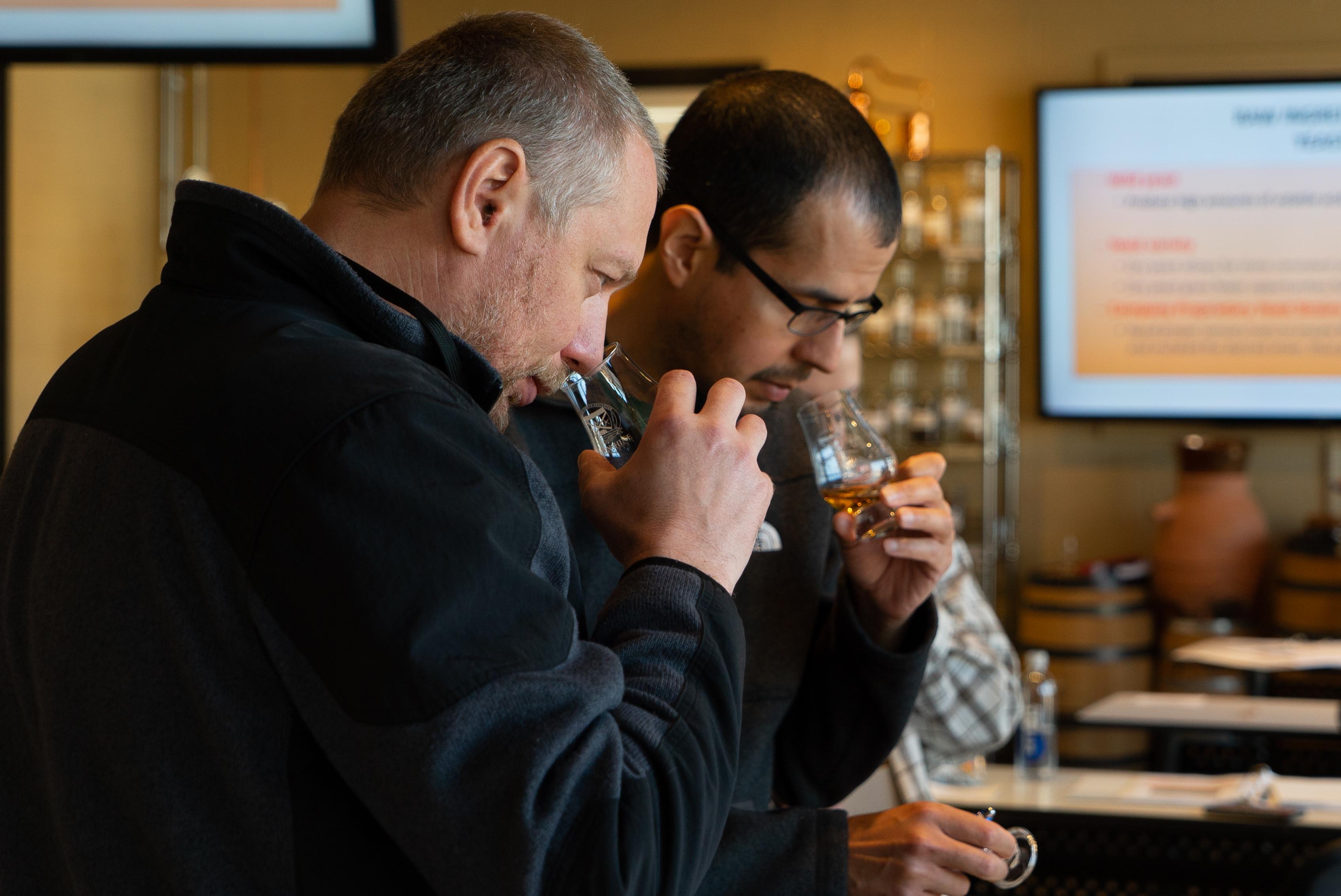
blog
Those that are familiar with the process of crafting distilled spirits may also be familiar with the 10 common congeners that are created during fermentation, and honed during the distillation run. Each congener has its own distinct personality, rendering unique tastes and aromas to the finished spirit.
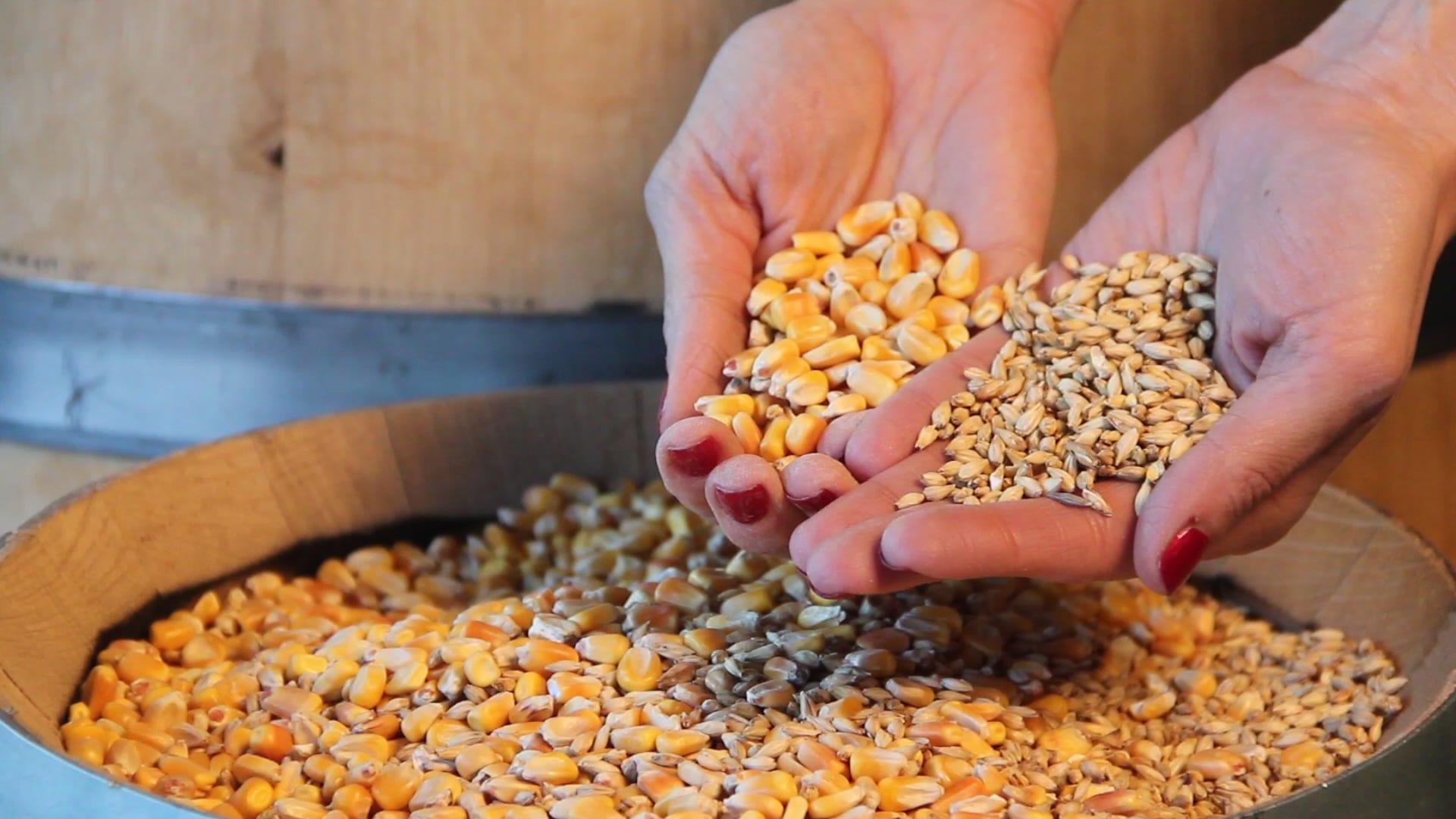
blog
So, you want to start distilling with freshly milled grain. Maybe you're tired of paying top dollar for the pre-milled stuff from the malt distributor, and you're ready to invest in the quality, efficiency, and bulk pricing that comes with milling your own whole grain. But where do you start?